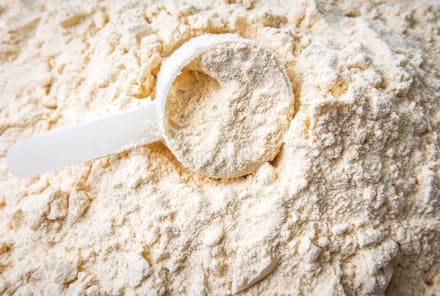Advertisement
How To Take Control Of Your Digestion For Life


During digestion, your gut not only comes in continuous contact with important nutrients your body needs, but also with toxins, food additives, microbes, and drugs that regularly pass through your digestive tract. Your gut has a huge task to not only serve as a porous filter for the building blocks of life, but also to keep out all the detrimental substances you might be exposed to.
Beyond being a gatekeeper, your gut digests food and absorbs nutrients, maintains an immune barrier, and helps you detoxify, all while maintaining the correct balance of healthy flora or probiotic (from the Greek pro = "for"; biota = "life") bacteria. Here's what could be messing with your gut health and digestion and how to fix it.
The biggest threats to your gut health:
Those are lofty jobs, but, unfortunately, things like diet and lifestyle factors can impede your gut from functioning optimally. Among the culprits that sabotage gut health, these are the five biggest offenders:
1. Food.
If you want to get to the root causes of what goes on inside your gut, then look at what you’re putting on the end of your fork. If you consume a milkshake, hamburger, and French fries, then you are turning on the genes that promote inflammation in your gut and body. On the other hand, if you eat two cups of steamed broccoli, then you are turning on healing and anti-inflammatory gene pathways.
The foods you eat really do control your state of health, and the gut is the gateway to the rest of the body.
Identifying and eliminating foods that rob your body of energy becomes a central focus in my program. Gluten, eggs, dairy, soy, most legumes, corn, and sugar (and, for some of you, nightshades) are inflammatory and will make you and your gut sick. When my patients eliminate these problem foods for at least 28 days, they feel better, they lose weight, and they heal their gut.
2. Stress.
The stress response can alter the natural balance of healthy bacteria in your gut, causing the gut ecology to shift in favor of a more hostile group of bacteria. When patients with gut issues visit me, I ask what they do to relieve and manage their stress, and often they say, "Nothing."
Many individuals are majorly lacking in the self-care department. Although they believe they don’t have the time or that stress management is a luxury, incorporating meditation and a few yoga stretches as part of a daily routine can take as little as 10 minutes. Those few minutes will pay off with big rewards for your gut and general sense of well-being.
3. Sleep.
Bad sleep creates a vicious cycle that damages your gut. Insufficient or poor-quality sleep also makes you crave sweet or starchy foods because your body is tired and demands quick energy to keep it going. By the next morning, your digestive system is out of sync, and eating can actually make you feel sick to your stomach.
With a few exceptions, like shift workers and new moms, the choice to have regular sleep times is yours. Regular sleep patterns and at least seven hours of uninterrupted nightly sleep are crucial for your gut and overall health.
4. Antibiotics.
Antibiotics are simply overprescribed. Most of the time, rest and immune support are enough to resolve infections for which doctors instead prescribe antibiotics. Antibiotic overuse is leading to more antibiotic-resistant bugs that are difficult to treat and can claim lives.
Each time you take an antibiotic, you are also altering your gut flora1. If you don’t eat the right foods, like fermented foods, or take a probiotic supplement, then you’ll inevitably suffer from dysbiosis—an imbalance between favorable and unfavorable microorganisms in your gut.
5. Toxins.
Everything from the air you breathe, to the food and water you consume, to the pharmaceutical drugs you take, create toxicity in the body. Preservatives, pesticides, and environmental toxins are among the major culprits that can damage your gut lining, creating leaky gut and other issues.
When considered together—antibiotics, eating the wrong foods, getting bad sleep, stressing out, and exposing yourself to toxins—you can begin to understand how gut imbalances occur, leading to chronic inflammation and problems like leaky gut.
When you get leaky gut, food and other particles slip through your gut lining into your bloodstream. Because your immune system does not recognize these, it attacks, leading to food sensitivities and more inflammation.
You might not even be aware of these sensitivities, which can take months or years to develop and can manifest as hives, allergies, chronic sinus inflammation, and migraines. These sensitivities often become the trigger for autoimmune disease or depression. This is why maintaining good gut health is crucial, and why havoc occurs throughout your body when your gut goes bad.
Health tips for better digestion and optimal gut health:
Although I take an individualized approach to digestion and optimizing gut health based on each patient’s conditions, medical history, preferences, and other factors, I have found that the following seven principles are a solid foundation for almost everyone.
Support the good guys with a probiotic supplement.*
The trillions of bacteria in your gut play many roles, including encouraging proper intestinal permeability (keeping things within your gut that shouldn’t slip out) and keeping out unfavorable bacteria, yeast, and parasites. You’ll always have some bad guys in your gut, but you want to keep your gut predominantly filled with good bacteria. To do that, you might want to supplement with a professional-quality probiotic.*
Look for a dairy-free probiotic that contains at least 10 billion CFUs each of Lactobacillus and Bifidobacterium guaranteed by the manufacturer through the expiration date. Take on an empty stomach once or twice a day for at least three months, and keep the probiotic refrigerated after opening to maintain its freshness and potency.
If you have leaky gut or an inflammatory bowel disease (such as Crohn’s or ulcerative colitis), then you could need to take up to 200 billion CFUs daily.* For these and other conditions that require a very high-dose probiotic, I recommend working with a gut-health specialist.
Eat a gut-supporting diet.
Focus on eating foods that are easy to digest, low in fructose and other sugars, and devoid of substances that are hard on your gut, like gluten, dairy, soy, and corn. I emphasize buying and eating foods that are organic, pesticide-free, non-genetically modified (GMO), full of healthy fats, locally grown, and sustainably farmed.
These include healthy fats, nuts and seeds, high-fiber and low-glycemic carbs, non-starchy veggies, and “clean” proteins like wild-caught cold-water fish. You should also eat plenty of fermented foods, like unpasteurized sauerkraut, kimchi, and no-sugar-added coconut yogurt.
If you want more specific instructions, then when you fill your plate with food imagine that it's divided into quarters. Fill one-quarter of your plate with protein and healthy, omega-3-rich fats (like wild-caught fatty fish, grass-fed meats, humanely raised and antibiotic-free chicken, and avocado), and fill the other three-quarters with raw, baked, or steamed greens and veggies. This simple rule will ensure that you get the right balance of proteins, fats, and carbs without the stress of having to weigh your food or count calories. Now you can simply enjoy the act of eating.
Focus on fiber.
Dietary fiber comes in two "flavors," and they each play a different role in gut health.
Soluble fiber attracts water and forms a gel-like substance during digestion, which helps you feel full longer and slows the rate at which sugar from food enters your bloodstream. Soluble fiber also doubles as a prebiotic because it feeds your good gut flora (more on that in a minute). Good sources of soluble fiber include apples, beans, blueberries, and freshly ground flaxseed.
Insoluble fiber, on the other hand, is found in vegetables and whole grains and provides bulk to your stool and prevents constipation. Because insoluble fiber doesn’t dissolve in water, it passes through your gut relatively intact, promoting the passage of both nutrients and waste.
Most foods contain a blend of soluble and insoluble fiber. If you also supplement, then look for a powder that contains a blend of soluble and insoluble fibers that mimic what you get in food.
Feed your gut flora.
Your probiotic flora feed on non-digestible fibers (called prebiotics) that promote the growth of beneficial flora. The best way to get prebiotics is to eat them.
Incorporate more prebiotic-rich foods into your diet, like raw chicory root, raw Jerusalem artichoke, and blanched dandelion greens. You might also want to take a prebiotic supplement—but so slowly—going too fast increasing prebiotic foods or a supplement can make you gassy.
Dial down inflammation.
The two primary omega-3 fatty acids -- eicosapentaenoic acid (EPA) and docosahexaenoic acid (DHA) -- are important anti-inflammatory promoters in the body that are often deficient in the American diet. Along with these foods, take one to four 1,000-milligram fish oil softgels daily with meals to enhance their absorption.
Consider digestive enzymes.
If you struggle with post-meal gas, bloating, and other problems, then your body might not be making sufficient digestive enzymes. Gut imbalances, stress, and age are among the factors that inhibit the digestive process.
For many patients, a supplement that replenishes digestive enzymes can reduce or eliminate this problem, especially while you’re healing your gut.
Be mindful when you eat.
How you eat is just as important as what you eat. Your eating philosophy not only factors into your food choices but also into how your body digests and assimilates foods. Slow down when you eat, really taste your food, chew thoroughly, breathe deeply, and be present with who you’re eating with.
Many individuals have a “no-technology” rule during family meals. A good rule of thumb is if you need to have a drink to help you swallow your food, then you’re probably eating too fast, swallowing air, and not chewing enough.
Watch Next
Enjoy some of our favorite clips from classes
Enjoy some of our favorite clips from classes
What Is Meditation?
Mindfulness/Spirituality | Light Watkins
Box Breathing
Mindfulness/Spirituality | Gwen Dittmar
What Breathwork Can Address
Mindfulness/Spirituality | Gwen Dittmar
The 8 Limbs of Yoga - What is Asana?
Yoga | Caley Alyssa
Two Standing Postures to Open Up Tight Hips
Yoga | Caley Alyssa
How Plants Can Optimize Athletic Performance
Nutrition | Rich Roll
What to Eat Before a Workout
Nutrition | Rich Roll
How Ayurveda Helps Us Navigate Modern Life
Nutrition | Sahara Rose
Messages About Love & Relationships
Love & Relationships | Esther Perel
Love Languages
Love & Relationships | Esther Perel


















